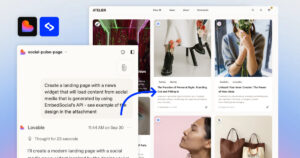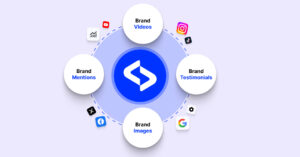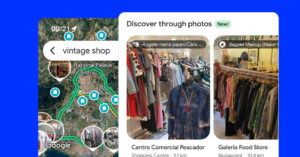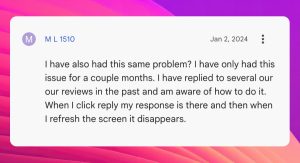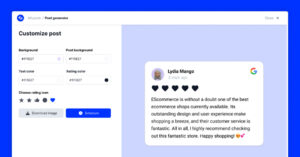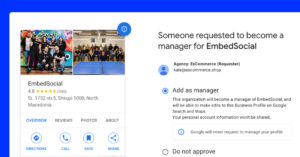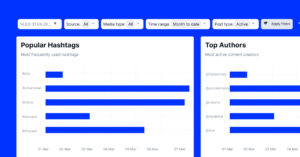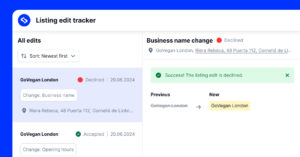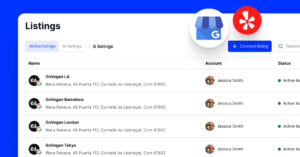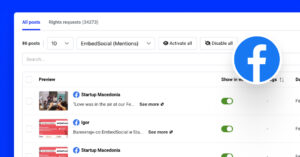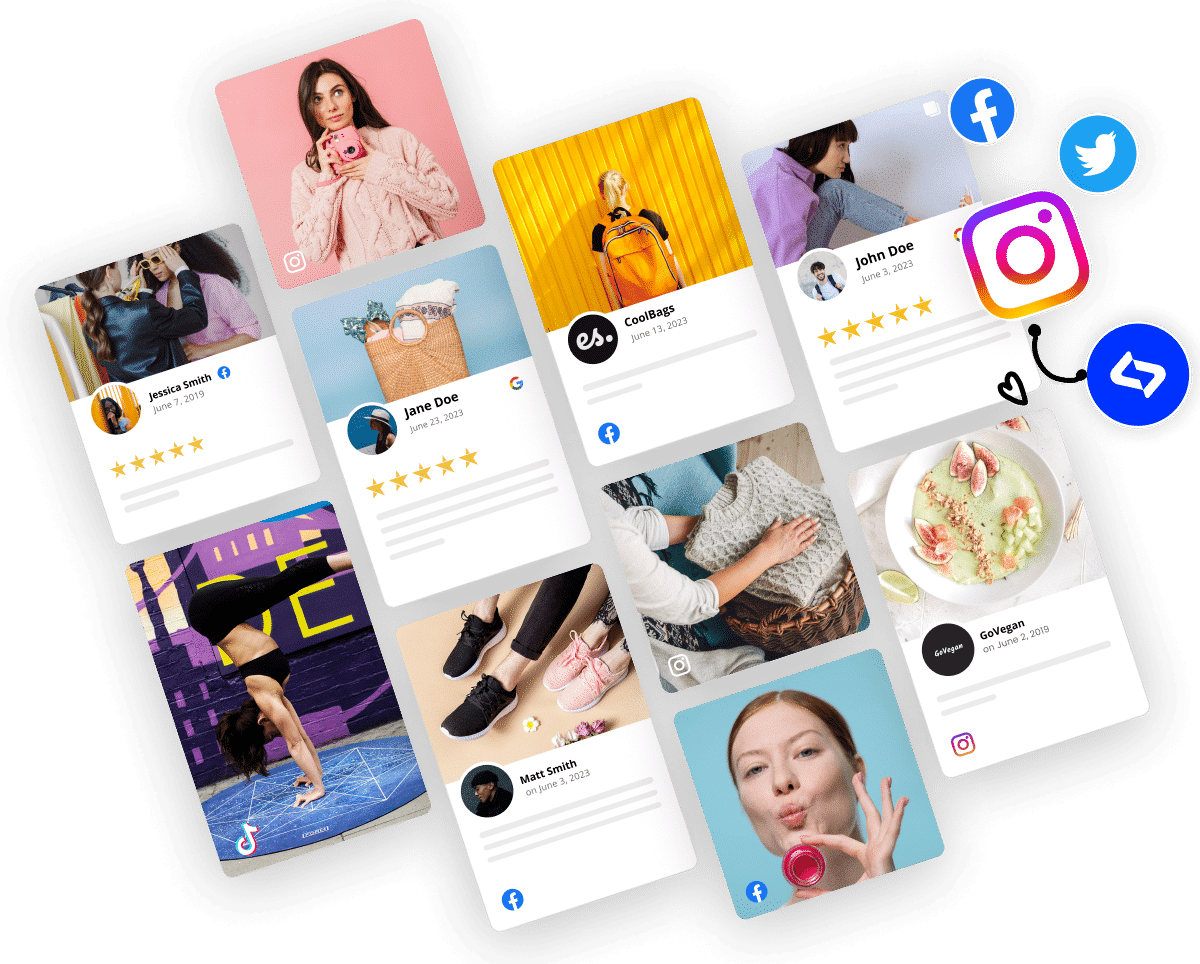La réalisation d'une enquête marketing est l'un des moyens les plus abordables et les plus efficaces d'effectuer des recherches approfondies et de collecter des données réelles. commentaires des clientsqui est considéré comme l'un des éléments clés du succès de toute entreprise, de tout produit ou de tout service.
Il est loin le temps où "sentiments instinctifs"Il suffisait de faire des suppositions. Aujourd'hui, le marketing basé sur les données est le fondement de la prise de décisions importantes et efficaces, quelle que soit la taille de votre entreprise.
Les enquêtes et l'utilisation de toutes sortes de formulaires de marketing font partie de l'ADN de toute équipe de marketing. Les intégrer dans vos activités de marketing est donc une évidence.
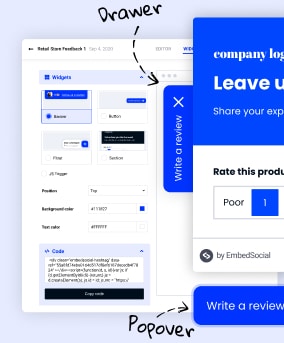
Créez tous vos formulaires web gratuitement
EmbedForms est le seul générateur de formulaires dont vous aurez besoin pour capturer des prospects, créer des enquêtes ou recueillir des commentaires sur votre site web.
Toutes les fonctionnalités PRO peuvent être annulées à tout moment.
Pourquoi les enquêtes marketing sont-elles importantes ?
Les enquêtes marketing et la recherche marketing en général sont considérées à juste titre comme un élément essentiel de toute entreprise, et ce pour plusieurs raisons :
Vous aider à identifier les opportunités et les menaces
La réalisation d'une étude de marché aide les entreprises à savoir dans quelle direction elles doivent aller et ce qu'elles doivent éviter en cours de route.
L'exemple parfait : la découverte de segments non atteints, c'est-à-dire de personnes qui ne connaissent peut-être pas votre marque, d'opportunités telles que des partenariats commerciaux et des collaborations, et de diverses manières d'améliorer votre produit/service, c'est-à-dire d'augmenter votre chiffre d'affaires auprès d'un plus grand nombre de clients.
Minimiser les risques
Une étude de marché bien menée vous fournira une série de données qui vous aideront à prendre de meilleures décisions et donc à réduire les risques d'échec à tout moment.
L'exemple parfait : l'expansion vers de nouveaux marchés - et croyez-nous quand nous disons que la connaissance est le pouvoir. Les données que vous recueillerez vous aideront à prévoir si vos produits se vendront bien au niveau régional et si l'expansion en vaut la peine ou non.
Gardez une longueur d'avance sur vos concurrents
Garder les yeux grands ouverts et faire des recherches sur vos concurrents vous aidera à garder une longueur d'avance. Vous pouvez examiner ce qu'ils font, comment ils progressent, quels canaux ils utilisent et comment ils utilisent les publicités payantes.
L'exemple parfait : lorsque vous transmettez une enquête sur le produit de votre concurrent, vous pouvez obtenir des informations précieuses sur ses caractéristiques les moins intéressantes et les plus intéressantes, et rester en tête en améliorant votre solution sur la base de ces données.
? Voici une liste avec les meilleurs outils de marketing et des logiciels, payants ou gratuits, qui vous aideront tout au long de votre parcours.
Connectez-vous avec votre public
L'étude et la compréhension de vos clients ne signifient qu'une chose dans le monde d'aujourd'hui : vous serez en mesure d'entrer en contact avec votre public de manière plus efficace. Au lieu d'utiliser une approche unique basée sur des données, vous serez en mesure de personnaliser votre message.
L'exemple parfait : lors d'une enquête sur le buyer persona, vous découvrirez les données démographiques de vos clients ainsi que leurs centres d'intérêt. En fonction de ces informations, vous pourrez personnaliser le message sur toutes les plateformes de médias sociaux - plus convivial et facile à vivre sur votre Instagram et TikTok, professionnel et sensibilisant sur votre profil LinkedIn.
En outre, avec 53% d'utilisateurs mondiaux Les consommateurs sont de plus en plus nombreux à faire des achats directement sur les médias sociaux. Comprendre le comportement de votre public sur ces plateformes peut améliorer de manière significative votre stratégie marketing et vos taux de conversion.
Enquête 1 : étude de marché
L'étude de votre marché afin d'obtenir des informations précieuses et de le comprendre est essentielle à chaque phase du développement et du lancement de votre produit/service.
Avant d'aborder la question de la réalisation de votre propre étude de marché, abordons quelques notions de base.
Selon le L'équipe de HubSpot:
"L'étude de marché est le processus de collecte d'informations sur votre marché cible et vos clients.".
L'étude de marché peut être réalisée de différentes manières et, dans notre cas, par le biais d'enquêtes. Nous pourrions donc dire qu'une étude de marché est une liste de questions auxquelles répondent vos clients/ou clients potentiels sur différents sujets.
Pourquoi le faire ? Ce type d'enquête vous aidera non seulement à comprendre vos clients et le marché sur lequel vous entrez, mais aussi à atteindre un public spécifique, à prendre de meilleures décisions, à mesurer la notoriété de votre marque, à comprendre comment positionner votre prix sur le marché, à obtenir des informations sur votre produit ou un produit futur, et à vous aider dans la création et la distribution de votre contenu.
Exemples d'études de marché :
- Quel est votre âge ? Quel est votre sexe ?
- Quel est votre niveau d'éducation ?
- Où habitez-vous ?
- Quelle est votre profession ? Que faites-vous pour gagner votre vie ?
- Quels sont les revenus et la taille de votre ménage ?
- Quels sont vos plus grands défis ?
- Quels sont vos hobbies/intérêts ? Que faites-vous pendant votre temps libre ?
- Qu'est-ce qui est le plus important pour vous ?
- Comment obtenez-vous vos informations ? Quelle est votre source d'information la plus précieuse et la plus fiable ?
- Comment aimez-vous faire vos achats ? Vous sentez-vous à l'aise pour faire des achats en ligne ?
Par exemple, en plus des enquêtes marketing régulières, il y a quelques années, Starbucks a créé un autre domaine dans le but de réaliser des études de marché, où les gens peuvent soumettre leurs idées et leurs propositions. MyStarbucksIdea.comqui n'est pas encore opérationnel, a accepté 100 idées de milliers de personnes dans le monde entier et les a mises en œuvre dans son entreprise. Des idées telles que l'ajout d'options végétaliennes à leur menu, etc.
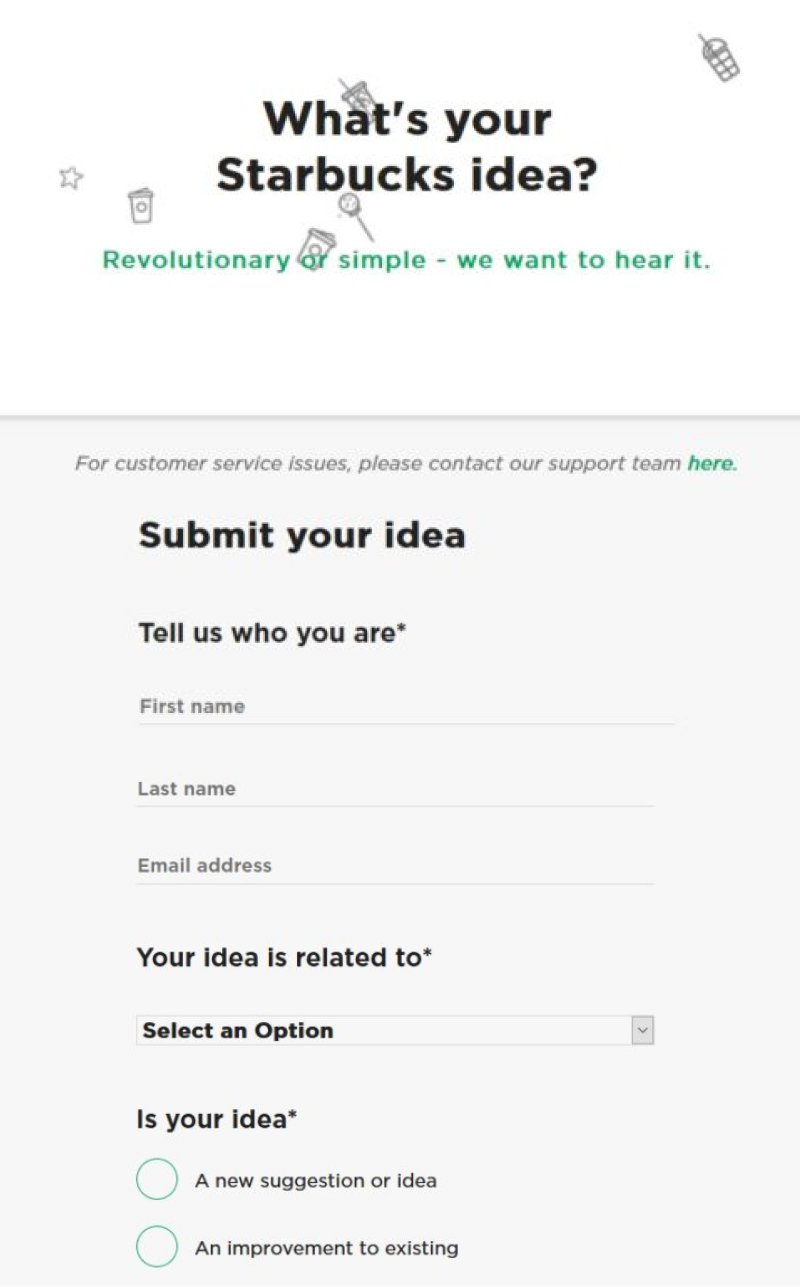
Une manière intéressante d'impliquer le public, de collecter des données et de réaliser une étude de marché sur les souhaits et les besoins de vos clients. Voici une vidéo complète de cette initiative :
Enquête 2 : Enquête sur les concurrents
Apprendre à connaître ses concurrents peut sembler effrayant et intimidant, mais en regardant la situation dans son ensemble, vous gagnerez en puissance et en perspective, ce qui vous aidera certainement à long terme.
Pourquoi le faire ?La réalisation d'une telle enquête vous aidera à comprendre qui sont vos concurrents, comment les gens les perçoivent par rapport à votre marque/produit/service, et comment votre offre et votre prix se situent par rapport à ceux de vos concurrents, ce qui vous aidera en fin de compte à cibler de nouveaux clients.
Exemples d'enquêtes sur les concurrents :
- Avez-vous entendu parler de notre entreprise/marque ?
- Avez-vous acheté quelque chose auprès de notre entreprise ?
- Si oui, quel est votre degré de satisfaction ? Depuis combien de temps êtes-vous client ?
- Si ce n'est pas le cas, quelle en est la raison ?
- Quelle est la probabilité que vous recommandiez notre entreprise à un ami ?
- Avez-vous entendu parler de #name d'un concurrent ?
- Avez-vous acheté à #name d'un concurrent ?
- Qu'est-ce qui vous a incité à nous choisir plutôt qu'un concurrent et vice versa ?
- Qu'aimeriez-vous que notre produit/service ait de plus que ce qu'il n'a pas actuellement ?
- Qu'est-ce qui vous plaît le plus/le moins ? Comment votre produit/service s'intègre-t-il dans votre flux de travail/répond-il à vos besoins quotidiens ?
Par exemple, la marque suédoise Les chaussettes du bonheur Avec l'aide de l'e-mail marketing et des sondages, l'entreprise étudie ses concurrents et l'expérience globale des consommateurs lors de leurs achats sur son site web. Pour que leur enquête soit encore plus fructueuse, ils offrent une réduction de 25% + les frais de port gratuits.
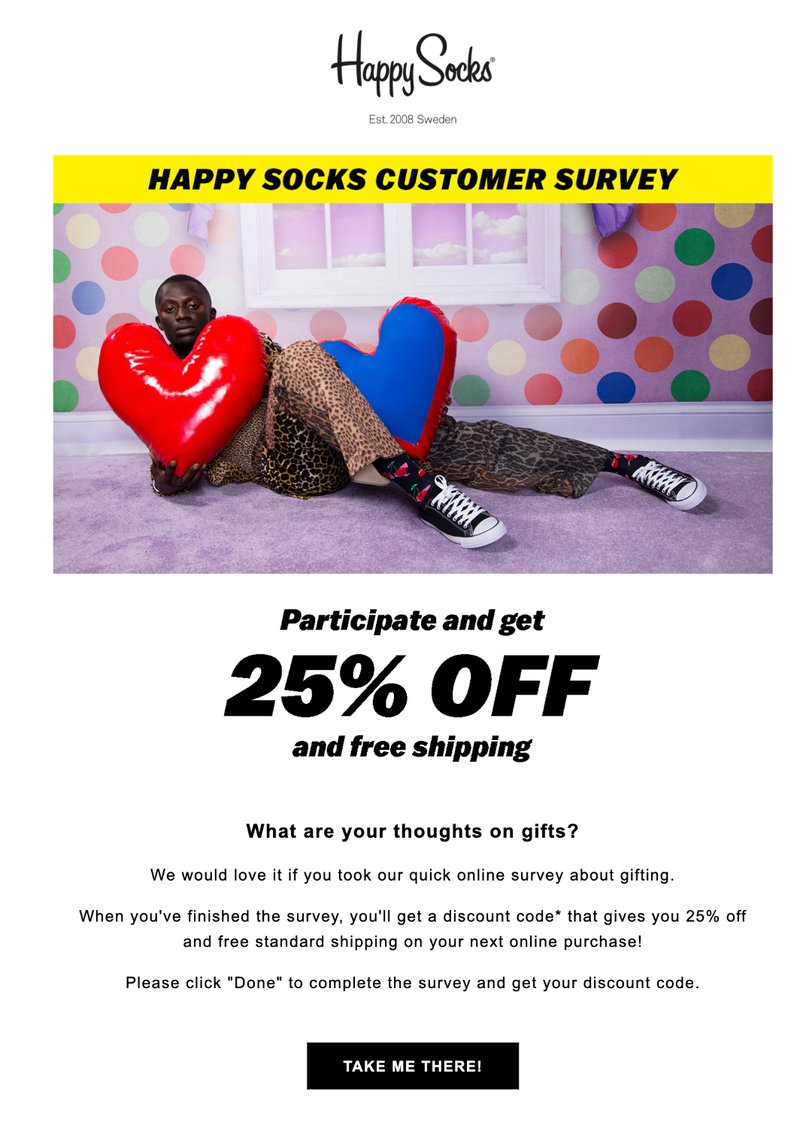
D'autres éléments méritent d'être examinés : comment vos concurrents attirent-ils les clients, quelle est la performance de leurs canaux de médias sociaux, quel est le volume de trafic de leur site web et à partir de quel type de sources, quels sont les mots clés pour lesquels ils se classent et quel est le type de contenu qu'ils proposent. Outils utiles : Google Trends, Semrushet AnswerThePublic.
Enquête 3 : Buyer persona / Enquête d'analyse de la clientèle
Dans le monde du marketing, les buyer personas sont des individus fictifs qui représentent votre client idéal.
Il s'agit d'une image de stock à côté d'un nom imaginaire, d'informations personnelles et d'objectifs, de défis et de centres d'intérêt, d'un titre de travail, de compétences et d'expérience et, surtout, de la façon dont vous vous intégrez dans leur vie (comment votre produit s'intègre dans leur mode de vie / quel problème résout-il ?).
Pourquoi le faire ?L'analyse détaillée de la clientèle à l'aide d'une enquête marketing vous aidera à comprendre les besoins et les problèmes de vos clients et à faire preuve d'empathie à leur égard ; sur la base de ces données, vous pourrez adapter vos efforts de marketingVous pouvez ainsi comprendre les décisions d'achat, obtenir des informations sur les comportements et créer un contenu plus ciblé pour chaque canal.
"D'après mon expérience, créer des profils d'acheteurs et apprendre à connaître nos clients (potentiels) a changé la donne. Cela nous a permis de planifier l'ensemble de notre stratégie de marketing de contenu. Sur tous nos canaux, nous avons commencé à personnaliser le message que nous voulions faire passer et le contenu publié. Cela nous a permis d'accroître l'engagement sur tous les canaux, d'augmenter le trafic organique de notre blog avec des visiteurs pertinents et, surtout, d'augmenter nos ventes".
Exemples d'enquêtes d'analyse de la clientèle :
- Questions démographiques telles que : Quel est votre âge, votre sexe, votre niveau d'études et votre parcours professionnel ?
- Quels sont vos centres d'intérêt et vos loisirs ? Que faites-vous pendant votre temps libre ?
- Pour quelle entreprise travaillez-vous / dans quel secteur d'activité / et quel est le nombre d'employés ?
- Quel est le titre de votre poste et quelles sont vos principales responsabilités ? À qui rendez-vous compte et qui vous rend compte ? Comment votre travail est-il évalué ?
- Quels sont vos plus grands défis (tant sur le plan professionnel que personnel) ? Qu'est-ce qui vous pousse à trouver une solution ?
- Quels sont les outils que vous utilisez dans votre travail ?
- Comment utilisez-vous notre produit/service/logiciel et quels sont vos principaux objectifs ?
- Quelle est la raison la plus fréquente pour laquelle vous n'achetez pas un certain produit ?
- Comment apprenez-vous les nouvelles informations et quels blogs/publications lisez-vous ? Quel est votre réseau social préféré ?
- Comment faites-vous vos achats ? Comment recherchez-vous des informations ? Comment décririez-vous votre dernier achat ?
Outils utiles pour la création de Buyer Persona à partir de votre enquête : Créer ma personnalité.
Une enquête marketing efficace qui vous aidera à comprendre le comportement des clients consiste à créer un formulaire de retour d'information très détaillé et approfondi. Voir l'exemple de Chipotle :
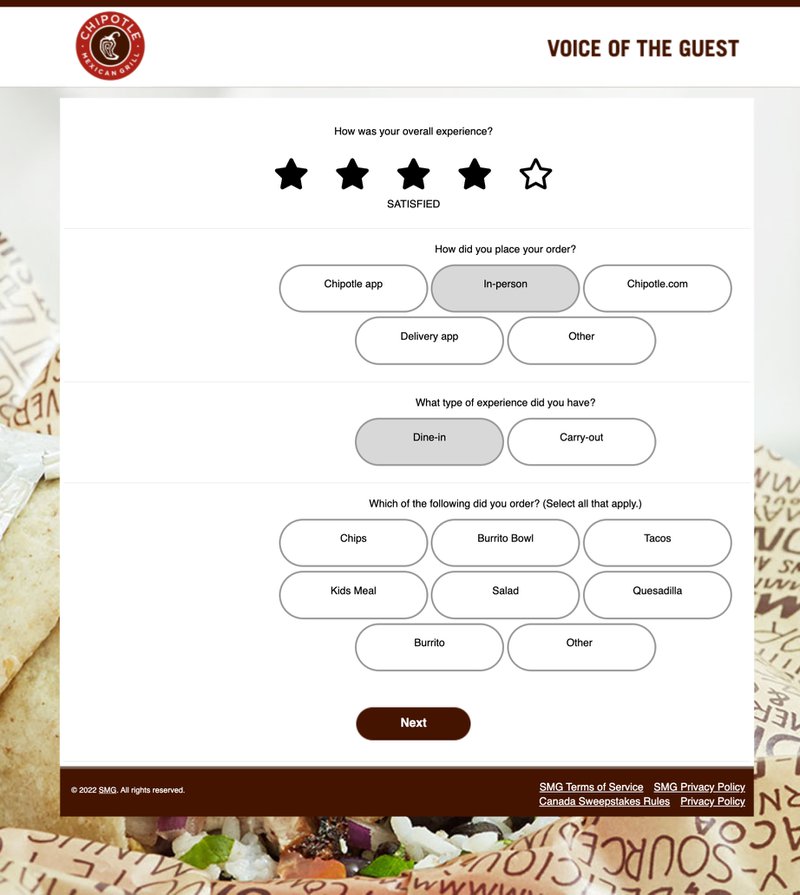
Enquête 4 : Enquête sur la notoriété de la marque
Dans quelle mesure votre marque est-elle mémorable ? Dans quelle mesure vos clients connaissent-ils votre marque ? Comment vos clients perçoivent-ils votre marque ?
Si vous souhaitez répondre à ces questions et à d'autres, il est grand temps de mener une enquête sur la notoriété de votre marque.
La notoriété de la marque est une combinaison de quatre éléments :
- reconnaissance de la marque - dans quelle mesure votre marque est-elle reconnaissable ?
- rappel de la marque - dans quelle mesure votre marque est-elle mémorable et comment est-elle perçue par vos clients ?
- l'identité de la marque - la mission et la vision de votre marque sont-elles bien comprises ?
- image de marque - l'impression générale et l'opinion que l'on a de votre marque
Pourquoi le faire ?? Apprendre à connaître la façon dont vos clients perçoivent votre marque vous aidera à améliorer votre positionnement sur le marché et, par conséquent, à développer votre entreprise et à accroître la notoriété de votre marque et vos ventes.
Prenons l'exemple de l'éternelle bataille entre Coke et Pepsi ? - il ne s'agit plus de savoir qui a le meilleur goût, mais plutôt de savoir qui a la communauté la plus fidèle.
Exemples d'enquêtes sur la notoriété de la marque :
- Quelles sont les marques auprès desquelles vous achetez le plus souvent des produits ?
- Parmi les marques suivantes, lesquelles reconnaissez-vous ?
- Si 1TP5Nom de la marque est une personne, comment la décririez-vous ? Quelle est votre opinion à son sujet ?
- Comment avez-vous découvert 1TP5Nom de la marque? Quelle est la probabilité que vous le recommandiez à un ami ou à un membre de votre famille ?
- Vous avez #un certain problème - vers quelle marque/entreprise vous tournez-vous ?
- Parmi les affirmations suivantes, lesquelles associez-vous à 1TP5Nom de la marque?
- Comment pouvons-nous vous fidéliser à notre marque ? Qu'est-ce qui est essentiel pour vous ?
- Quelle est la première chose qui vous vient à l'esprit lorsque vous pensez à #name of the brand ?
- Quand avez-vous utilisé pour la dernière fois le nom # de la marque ?
- Connaissez-vous notre marque ?
Voici d'autres questions et un modèle modèle d'enquête sur la notoriété de la marque que vous pouvez utiliser dès maintenant :
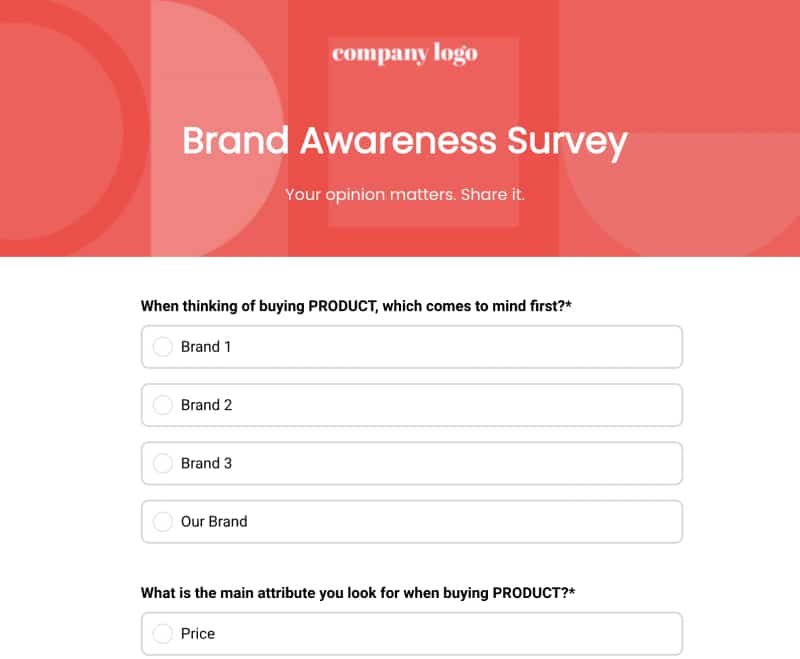
Enquête 5 : Enquête de recherche sur les produits
Le lancement d'un nouveau produit demande beaucoup d'efforts, d'argent et de temps, mais il s'accompagne également d'une grande incertitude et de la peur de l'échec.
Vous ne savez jamais si le produit sera un succès ou non, mais il y a une solution à vos doutes : mener une enquête de recherche sur les produits.
Une enquête de recherche sur les produits peut être utilisée aussi bien pour le lancement d'un nouveau produit que pour l'amélioration d'un produit existant.
Pourquoi le faire ?Il vous aidera à évaluer la réaction et l'opinion de vos clients à l'égard de votre nouveau produit ou de votre produit amélioré et, par conséquent, à prendre de meilleures décisions concernant les fonctionnalités, les caractéristiques et la conception du produit.
Exemples d'enquêtes de recherche sur les produits :
- Combien de fois utilisez-vous notre produit/service au cours de la journée/semaine/mois ?
- Depuis combien de temps utilisez-vous notre produit/service ?
- Comment évaluez-vous notre produit/service ?
- Quels sont les problèmes que vous essayez de résoudre avec notre produit ?
- Quelles sont les fonctionnalités manquantes ?
- Quelles sont les caractéristiques qui vous intéressent le plus ?
- Quelles sont les caractéristiques importantes qui pourraient être améliorées ?
- Quelle est la facilité d'utilisation de notre produit/évaluation sur une échelle de 0 à 10 ?
- Comment évaluez-vous le rapport qualité-prix ?
- Avez-vous rencontré des problèmes lors de l'utilisation de notre produit/service ?
Par exemple, Alex Tooby souhaitait prendre le pouls de son public afin de comprendre quel type de contenu (son type de produit) il souhaiterait qu'elle crée. Il s'agit d'une enquête marketing parfaite pour connaître les besoins de son public cible afin d'adapter ses services à leurs besoins réels.
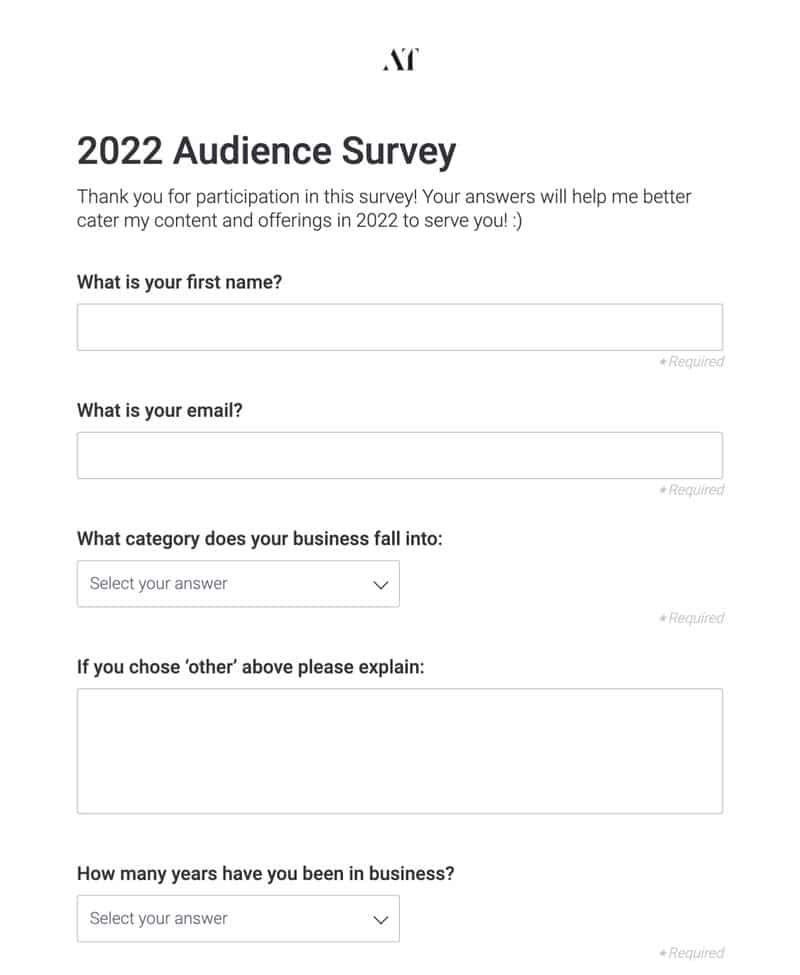
Étapes de la réalisation d'une enquête marketing
Maintenant que vous connaissez les principaux types d'enquêtes marketing, il n'est que juste de passer à un pas-à-pas pratique sur la manière de mener une seule enquête.
Étape 1 : Fixer un objectif clair
Avant de commencer à rédiger ces questions, réfléchissez à l'objectif précis de l'enquête de marketing.
Vous envisagez d'étendre votre activité à d'autres marchés ? Envisagez-vous de créer et de lancer un nouveau produit ou d'améliorer un produit existant ? Que cherchez-vous à découvrir exactement en réalisant l'enquête ?
La définition d'objectifs et d'intentions clairs pour l'enquête de marketing vous aidera à obtenir les réponses dont vous avez besoin.
Étape 2 : Établir un flux de travail pour la tâche
Il s'agit là d'une tâche plus technique, mais néanmoins importante. Veillez à établir un budget, à choisir les marchés que vous souhaitez étudier, à décider si vous ferez appel à une société d'études de marché pour vous aider et, en fonction de vos objectifs, à choisir ce que vous allez étudier.
Étape 3 : Choisissez l'outil dans lequel vous allez créer l'enquête
Veillez également à bien réfléchir à l'aspect de l'enquête de marketing. Vous ne voulez pas submerger votre groupe cible avec trop de questions à la fois ou avoir une enquête dont la conception n'est pas pratique.
Étape 4 : Collecte et analyse des données, et enfin
Étape 5 : Passer à l'action
Sur la base des résultats de vos recherches et de vos objectifs initiaux, vous pouvez prendre une décision sûre et choisir la direction dans laquelle vous voulez "avancer".
Outils d'enquête marketing gratuits
Maintenant que nous avons passé en revue tous les comment et pourquoi, il ne reste plus que les outils avec lesquels vous pouvez créer ces enquêtes, et voici quelques options gratuites :
- Formulaires Google - Il est gratuit, rapide et enregistre même automatiquement vos résultats dans une feuille de calcul Google afin que vous puissiez les analyser. Il existe des options polyvalentes pour les réponses longues et courtes, les sélections à choix multiples, les options déroulantes, la possibilité d'ajouter des images et des vidéos, de créer votre formulaire sous la forme d'un quiz, etc.
- Microsoft Forms - Vous préférez Microsoft à Google, Excel à Google Sheets ? Si c'est le cas, optez pour ce générateur de formulaires. Il est gratuit, simple et connecté à Excel, qui offre des fonctionnalités d'analyse de données plus puissantes.
- Jotform - est un autre générateur d'enquêtes en ligne gratuit qui est surtout connu pour son énorme bibliothèque de formulaires avec environ 10 000 enquêtes. Les cinq premiers formulaires sont gratuits (tout ce qui est supérieur est facturé $24 par mois).
- EmbedForms - est une solution innovante qui vous aidera non seulement à créer des formulaires, mais aussi à transformer ces formulaires en widgets pour votre site web. En plus d'être toujours gratuit, cet outil de construction est doté de fonctionnalités utiles telles qu'un éditeur avancé par glisser-déposer, des options de logique conditionnelle pour créer un certain flux de votre formulaire, et un moyen facile de partager les résultats de vos enquêtes marketing.
Si vous cherchez d'autres alternatives, voici une liste de plus de 25+. Outils de création de formulaires.
Conclusion
L'utilisation d'enquêtes est une abordable et efficace Le site web de la Commission européenne est un moyen d'obtenir des informations précieuses à la fois pour le marché et pour vos clients, alors n'hésitez pas à en tirer le meilleur parti !
Maintenant que vous disposez de toutes les informations nécessaires, vous n'avez plus besoin de passer du temps à chercher les bonnes questions ; au contraire, vous pouvez vous concentrer sur l'obtention du retour d'information des clients et sur la prise de meilleures décisions basées sur les données.


